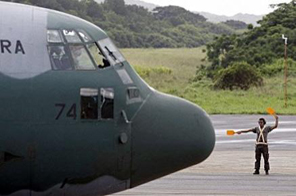Search continues for missing jet
PARIS: French and Brazilian search teams have found no debris confirmed to have come from the Airbus A330 that vanished over the Atlantic, officials said Friday.
Confusion broke out after Brazilian officials said Thursday that a helicopter had plucked from the sea an airplane cargo pallet from the Air France flight — only to retract the claim hours later.
France's Transportation Minister, Dominique Bussereau, suggested Friday that searchers were back to square one in the hunt for Flight 447 bound from Rio de Janeiro to Paris, which went down off Brazil late Sunday.
"French authorities have been saying for several days that we have to be extremely prudent," Bussereau told France's RTL radio. "Our planes and naval ships have seen nothing."
A French Defense Ministry official, speaking only on condition of anonymity because he was not authorized to speak publicly on the matter, said French teams "cannot precisely confirm the zone where the plane went down."
Also Friday, Brazil's Air Force was flying designated relatives of victims Friday from Rio de Janeiro to the military's search command post in the northeastern city of Recife so they could tour the operation and ask questions. Recife has a large air force base where debris and any human remains will be brought after being picked up at sea.
The pallet Brazilian officials initially said came from the plane pallet was made of wood, and the plane was not carrying wooden pallets, Brazilian Air Force Gen. Ramon Cardoso told reporters. He did not say where the pallet might have come from.
"So far, nothing from the plane has been recovered," Cardoso said.
Cardoso said a large oil slick spotted by search plane pilots was not from the Airbus, but that another slick of kerosene found may have been from the downed passenger jet.
"The oil was not from the plane because there wasn't oil of that quantity (on the plane) to cause that slick," he said.
Bussereau called the false finding of debris by the Brazilian teams "bad news ... We would have preferred that it had come from the plane and that we had some information," he said.
Bussereau said the search must continue and stressed that the priority was finding the flight recorders. The plane went down with 228 people on board in the world's worst aviation disaster since 2001.
French officials stopped short of criticizing their Brazilian counterparts.
"Brazilian authorities first indeed hoped to have found parts of the plane, then unfortunately, arriving in the area, realized it wasn't the case," said French Foreign Ministry spokesman Eric Chevallier. "Unfortunately that can happen."
French Defense Minister Herve Morin and the Pentagon have said there no signs that terrorism was involved, but Morin declined to rule out the possibility.
From the start of the investigation, "I've said we can't exclude terrorism," Morin told reporters Friday. "We have no element which allows us to corroborate that."
"The inquiry that is taking place has never excluded this thesis," he said.
Brazil's defense minister said the possibility was never considered.
Investigators are looking into whether malfunctions in instruments used to determine airspeed may have led the plane to be traveling at the wrong speed when it encountered turbulence from towering thunderstorms over the Atlantic.
Two aviation industry officials told The Associated Press on Thursday that investigators were studying the possibility that an external probe that measures air pressure may have iced over. The probe feeds data used to calculate air speed and altitude to onboard computers. Another possibility is that sensors inside the aircraft reading the data malfunctioned.
If the instruments were not reporting accurate information, the jet could have been traveling too fast or too slow as it hit turbulence from violent thunderstorms, according to the officials.
Jetliners need to be flying at just the right speed when encountering violent weather, experts say — too fast and they run the risk of breaking apart. Too slow, and they can lose control.
European planemaker Airbus has sent an advisory to all operators of the A330 reminding them of how to handle the plane in conditions similar to those experienced by Flight 447, which was an Airbus A330-200 version.
Airbus spokesman Justin Dubon said the planemaker sent a reminder of A330 operating procedures to airlines late Thursday after the French agency investigating the crash said the doomed flight had faced turbulent weather and inconsistency in the speed readings by different instruments. That meant "the air speed of the aircraft was unclear," Dubon said.
In such circumstances, flight crews should maintain thrust and pitch and — if necessary — level off the plane and start troubleshooting procedures as detailed in operating manuals, Dubon said.
Meteorologists said the Air France jet entered an unusual storm with 100 mph (160 kph) updrafts that acted as a vacuum, sucking water up from the ocean. The moist air rushed up to the plane's high altitude, where it quickly froze in minus-40 degree temperatures. The updrafts also would have created dangerous turbulence.
The jetliner's computer systems ultimately failed, and the plane broke apart likely in midair as it crashed into the Atlantic on a flight from Rio de Janeiro to Paris Sunday night.
But investigators will have little to go on until they recover the plane's "black box" flight data and voice recorders, now likely on the ocean floor miles beneath the surface.






